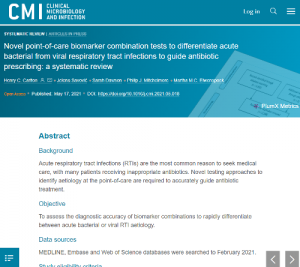What rapid tests can help clinicians tell the difference between bacterial and viral respiratory tract infections?
24 June 2021
Rapid tests already on the market that combine more than one biomarker may be more effective at distinguishing between bacterial and viral respiratory tract infections than standard single biomarker tests, a review of the evidence has found. The study, led by University of Bristol undergraduate medical student Henry Carlton and supervised by ARC West staff, found 20 studies but 18 of those had methodological issues, meaning the results should be treated with caution.
It’s often impossible to tell from signs and symptoms alone whether a patient has a viral or bacterial infection. As a precaution, clinicians often prescribe antibiotics when in doubt, but antibiotics do not help against viral infections and overuse can lead to antibiotic resistance.
Clinicians need rapid tests to decide whether to prescribe antibiotics, because the traditional tests are slow and give results too late. There are two rapid tests currently in use: one measures the biomarker C-reactive protein (CRP) and the second procalcitonin (PCT). However, these tests are not very reliable and often get it wrong. Combining several different biomarkers in one test may give more reliable answers.
The team reviewed research on new rapid tests in GP practices or in hospital, including tests that combined two or more biomarkers. Tests under development and tests that are already on the market were included. They estimated the accuracy of these tests where possible.
The 20 studies included described 15 different tests that identified bacterial infections and nine different tests for viral infection. However, 18 of these studies had methodological problems, which may have affected their results.
The accuracy of these tests varied, with some showing the potential to be used in healthcare. In particular, two already commercially available tests, ImmunoXpert and FebriDx, were able to differentiate patients with bacterial infections and patients with viral infections.
The ImmunoXpert test combined three biomarker measures to identify bacterial or viral infections. It was able to provide results in 100 minutes. The FebriDx test combined two measures and was able to turnaround results in just 25 minutes.
ImmunoXpert (five studies) and FebriDx (five studies) were the only two tests to have been repeated in more than one study. This meant the results could be combined for each test to estimate how accurate they are. Both tests were more accurate for both bacterial and viral infections than standalone biomarkers of CRP and PCT. When the team modelled their potential use in GP and hospital environments, they were both shown to reduce the number of patients prescribed antibiotics for viral infections and reduce the number of patients not receiving antibiotics for their bacterial infections, compared with using single biomarker tests.
Henry Carlton said:
“The FebriDx and ImmunoXpert tests show a lot of potential and could reduce unnecessary antibiotic prescriptions. But the methodological problems with many of the studies means that these we need to interpret these findings with caution.
“We were also unable to make recommendations about use in primary care, because there weren’t any studies looking at this. More research is needed on biomarker combinations, GP care, patient outcomes and cost-effectiveness.”
Paper
